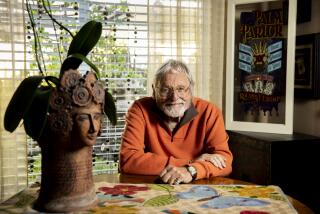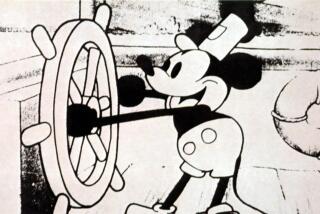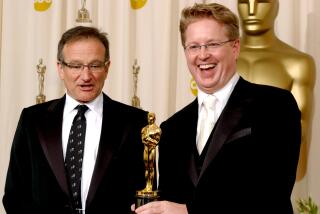MOVIE REVIEW : ‘THE ARISTOCATS’: WALT LEFT A GAP
Walt Disney rarely drew anything during his long career in animation, but artists who worked with him generally agreed he was the best story editor ever to work in the medium. The minimal storyline in “The Aristocats” (1970), being rereleased citywide Friday, reveals how essential he was in shaping the studio’s animated features--and how significant a gap he left. “Aristocats” was the first film made entirely after his death.
The setting is Paris, 1910. When Edgar, the unscrupulous butler of the wealthy Madame Bonfamille, learns that he’s the beneficiary of her will after her cats, he drugs them and dumps them in the countryside. (His actions seem premature at best: The woman is apparently in excellent health.) Duchess, a white shorthair (voice by Eva Gabor), and her three kittens, Toulouse, Berlioz and Marie, are rescued by the jaunty feline ne’er-do-well, Thomas O’Malley (Phil Harris, essentially repeating the vocal performance he gave as Baloo in “The Jungle Book” three years earlier).
Thomas guides Duchess and her family back to Paris, where they meet his jazz-playing alley cat buddies, led by Scat Cat (voice by Scatman Crothers). After the jazz gang helps Thomas defeat the villainous Edgar and rescue Duchess a second time, Madame Bonfamille decides to adopt them all.
The plot does little more than link a string of vaguely related episodes, intended to provide comedy, excitement and music. Two long sequences involving a pair of English geese and their drunken uncle have nothing to do with the story, nor do Edgar’s slapstick battles with two Southern dogs, voiced by Pat Buttram and George Lindsey.
Anachronisms abound: What are two good ol’ dogs from Georgia, who talk about “li’l cricket bugs,” doing in Belle Epoch France? How did a ‘60s hippie cat with shaggy hair and love beads get in the alley cat jazz band? And why are the cats playing jazz in Paris in 1910, when the music didn’t become popular there until after World War I?
Quite a lot of “Aristocats” borrows from other Disney features. “Ev’rybody Wants to Be a Cat,” the upbeat duet between Thomas and Scat Cat, is little more than a reprise of “I Wanna Be Like You,” the duet between Baloo and King Louie in “The Jungle Book.” Edgar’s defeat by the cats and a horse recalls the similar defeat of the Bad’uns, Horace and Jasper, by dogs and a horse in “101 Dalmatians.” The ending of the film, with Thomas, Duchess and the kittens posing for pictures, is lifted from “Lady and the Tramp.”
But even at their least original, the Disney artists provide better animation--and more entertainment--than the recent animated features hawking “The Care Bears,” “Rainbow Brite” and “Transformers.” Parents and children can do a lot worse than to spend an afternoon during spring break with Thomas O’Malley and Duchess.
More to Read
Only good movies
Get the Indie Focus newsletter, Mark Olsen's weekly guide to the world of cinema.
You may occasionally receive promotional content from the Los Angeles Times.










